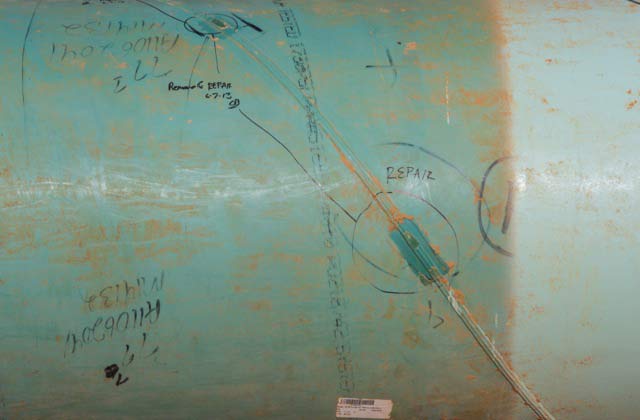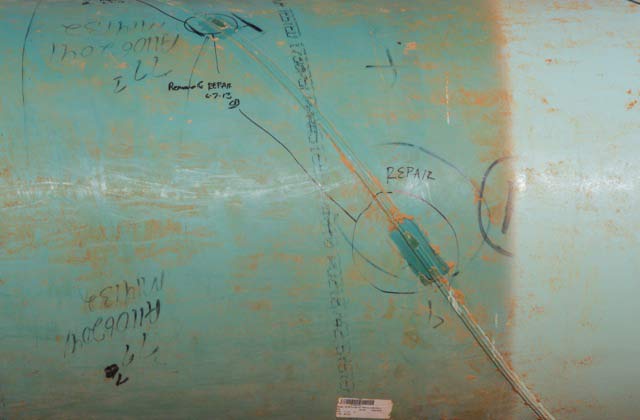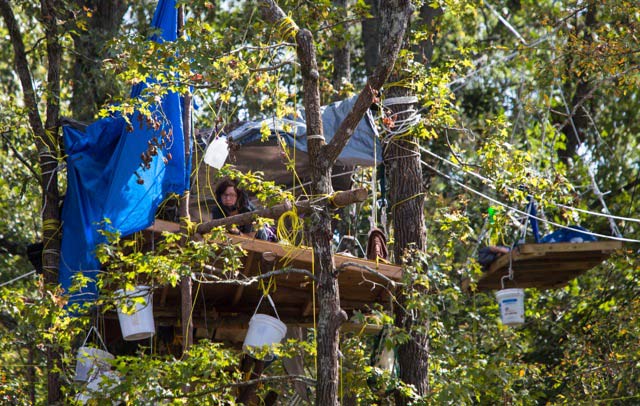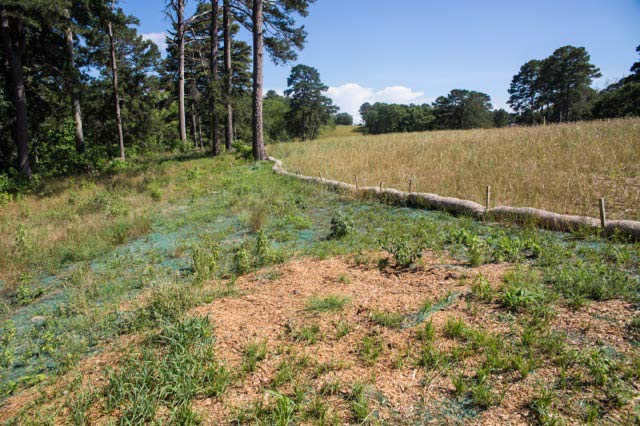
Honest, paywall-free news is rare. Please support our boldly independent journalism with a donation of any size.
A month after revealing that TransCanada is under a compliance review for the Keystone 1 Pipeline, the Pipeline Hazardous Materials Safety Administration (PHMSA) disclosed it is also investigating the operations of Keystone XL’s southern route, renamed the Gulf Coast Pipeline when the project was split in half.
The results of these investigations could play a part in President Obama’s final decision on the Keystone XL permit that TransCanada needs to complete its Keystone pipeline network. According to the State Department’s website, one of the factors the KXL presidential permit review process focuses on is compliance with relevant federal regulations.
At TransCanada’s latest shareholder meeting in Calgary, Evan Vokes, a former employee turned whistleblower, asked CEO Russ Girling why the company had not disclosed the ongoing investigations in its current annual report. Girling acknowledged that the company is under review, but assured shareholders that pipeline safety remains the company’s top priority.
After informing stockholders that another whistleblower recently disclosed documents showing that TransCanada had broken the same rules that Vokes exposed in 2010, he asked Girling what TransCanada had done to change things since Vokes worked for the company.
“To the extent that they [the regulators] find any issues with our corporation, we will change to evolve but at the current time there has been nothing put forward that we need to respond to,” Girling said. “Across 70,000 kilometers of pipeline and 64 billion dollars of rotating equipment, there are things we have to address everyday,” Girling said, without citing anything specific.
Vokes alleges TransCanada’s “culture of noncompliance” has not changed. Mounting pipeline failures, including the Suffield Lateral line in Alberta, Canada that failed on May 11, help validate his claim.
“Shareholders believe they have safe mom-and-pops blue chip shares,” Vokes told DeSmog. “But the stock has a larger liability than stockholders imagine.”
Vokes likened holding stock in TransCanada to “roulette table investing.”
Multiple noncompliance issues alleged by PHMSA raise questions about the integrity of the completed segments in TransCanada’s Keystone pipeline network. The network is made up of the Keystone1 Pipeline, the Cushing Gulf Coast Extension, and the Gulf Coast Pipeline. The northern route of the Keystone XL, if built, will complete the network.
 Marking on the Gulf Coast Pipeline at an anomaly excavation site. (Photo: ©2013 Julie Dermansky)
Marking on the Gulf Coast Pipeline at an anomaly excavation site. (Photo: ©2013 Julie Dermansky)
The Keystone 1 line starts in Hardisty, Alberta, and connects to the Cushing Gulf Coast Extension pipeline in Steele City, Nebraska. The Cushing Gulf Coast Extension pipeline ends in Cushing, Oklahoma, where it connects to the Gulf Coast pipeline, which ends up at refineries on the Gulf Coast of Texas. The northern route of the Keystone XL, if built, would run from Hardisty to Cushing, where it would connect to the Gulf Coast pipeline.
The Keystone 1 pipeline had over a dozen spills in its first two years of operation. And TransCanada temporarily shut down the pipeline when areas of extreme external corrosion were detected in Oct. 2012.
Cathodic protection is used to prevent pipelines’ external walls from corroding. When DeSmog asked TransCanada if the Keystone 1 pipelines’ cathodic protection failed, the company did not reply; however, a spokesperson for the company told Politico that the problems were linked to “low-voltage electric currents from Keystone and a nearby pipeline interfering with one another.”
“That explanation describes a failure in the cathodic protection,” Vokes told DeSmogBlog, “If the code of construction was followed, the corrosion would not have happened.”
TransCanada’s internal report on lessons learned from the building of the Cushing Extension recommends, “addressing noncompliance issues.”
PHMSA’s final inspection report on the Gulf Coast pipeline noted instances of TransCanada’s failure to adhere to the code. The company got unsatisfactory marks on welding procedures and installation practices related to the pipeline’s cathodic protection.
Warning letters sent by the agency to TransCanada reprimanded the company for hiring unqualified welders and not protecting the pipeline’s coating during installation.
TransCanada sent a letter in response, claiming the company had remedied all of the issues that had PHMSA concerned. It also assured the agency that all the anomalies (defects in a pipeline) identified by a mandatory pressure test were inspected and repaired.
Public Citizen, an advocacy group, and the Tar Sands Blockade, a grassroots activist organization, conducted their own investigation of the repair work done on the Gulf Coast pipeline. They remain skeptical of the pipeline’s integrity because the same contractors whose non-compliant work led to the problems were tasked to fix them.
Both groups, along with concerned landowners on whose land the pipeline was built, asked that PHSMA require TransCanada to do a new pressure test to check the integrity of the repair work done, including segments of the pipeline that were replaced.
PHMSA has the power to require an additional pressure test — or shut a pipeline down — if the agency “feels there is a serious risk,” PHMSA spokesman Damon Hill told DeSmog.
The agency did not require an additional pressure test of the Gulf Coast line, but Hill said, “we aren’t shy about using the full force of our enforcement authority when we need to.”
While no fines were issued when the final inspection report was completed, Hill said the agency reserves the right to fine TransCanada at the conclusion of its review of the pipeline’s operations.
Vokes thinks it was irresponsible for PHSMA not to demand a new pressure test after Public Citizen reported observers found 125 excavation sites of possible anomalies in a 250-mile stretch of the Gulf Coast line. DeSmog asked TransCanada for the final count of the repairs done to the pipeline, but the company never cited a figure.
“The lack of accountability with regulators is appalling,” Vokes said. PHSMA and the National Energy Board of Canada have done nothing more then scold TransCanada.
Compliance issues related to other aspects connected to the Keystone XL pipeline have also arisen. An environmental impact study in Texas was not completed before President Obama fast-tracked the Gulf Coast Pipeline. Though the Sierra Club lost a case to get a temporary injunction to stop the pipeline from being built, alleging the National Environment Protection Act requires an environmental impact study, Michael Bishop, a landowner in Douglas, Texas, is challenging the government with a similar lawsuit.
Furthermore, President Obama has failed to nominate a new head of PHSMA in the required time allotted for him to do so. PHSMA has been without a leader for more than 425 days.
FBI Spying on Pipeline Activists
The FBI’s monitoring of the Tar Sands Blockade’s activities “breached its own internal rules,” according a report by the Guardian, by “failing to get approval before it cultivated informants and opened files on individuals protesting against the construction of the pipeline in Texas.”
 Member of the Tar Sands Blockade during a tree sit in the path of the Gulf Coast Pipeline in Winnsboro, Texas. (Photo: ©2012 Julie Dermansky)
Member of the Tar Sands Blockade during a tree sit in the path of the Gulf Coast Pipeline in Winnsboro, Texas. (Photo: ©2012 Julie Dermansky)
Documents obtained by The Guardian and Earth Island Journal for the report revealed that the “FBI’s Houston office said it would share with TransCanada “any pertinent intelligence regarding any threats” to the company in advance of a forthcoming protest.” Also that “one FBI investigation, run from its Houston field office, amounted to “substantial non-compliance” of Department of Justice rules that govern how the agency should handle sensitive matters.”
“There is a raft of criminal behavior on the part of TransCanada that doesn’t raise the eyebrows of the FBI the way that a group of peaceful protesters engaging in civil disobedience did,” Tar Sands Blockade member Ramsey Sprague told DeSmog. “You have landowners who accused TransCanada of racketeering and eminent domain land theft issues,” he said. “TransCanada’s failure to restore condemned land, leaving property like Julia Trigg Crawford’s in ruins, offers further proof the company ignores its contractual obligations.”
Julia Trigg Crawford, a Texas landowner who fought against TransCanada’s right to condemn her land, and other Texas landowners including Eleanor Fairchild and Michael Bishop who resisted TransCanada before ultimately signing agreements with the company, each told DeSmogBlog that their land has not been restored to its original condition.
 Efforts to control erosion that began after the installation of the Gulf Coast Pipeline on Eleanor Fairchild’s land in Winnsboro Texas have failed. According to Fairchild her land has yet to be restored to its original condition. (Photo:©2013 Julie Dermansky)
Efforts to control erosion that began after the installation of the Gulf Coast Pipeline on Eleanor Fairchild’s land in Winnsboro Texas have failed. According to Fairchild her land has yet to be restored to its original condition. (Photo:©2013 Julie Dermansky)
Sprague is also concerned about TransCanada’s “shoddy construction.” The Tar Sands Blockade and Public Citizen documented questionable practices during the construction and repair of the Gulf Coast pipeline that show damaged coating of the pipeline and holes in a weld that light could shine through.
President Obama’s decision to grant TransCanada the needed permit allowing the pipeline to cross international borders could come at any time. Eight federal agencies have all completed reviews they were requested to do.
Issuing a permit for the northern route of the Keystone XL before PHMSA’s investigations are completed would be contrary to the State Department’s own guidelines.
But who follows the rules these days?
Matching Opportunity Extended: Please support Truthout today!
Our end-of-year fundraiser is over, but our donation matching opportunity has been extended! All donations to Truthout will be matched dollar for dollar for a limited time.
Your one-time gift today will be matched immediately. Your monthly donation will be matched for the whole first year, doubling your impact.
This matching gift comes at a critical time. As Trump attempts to silence dissenting voices and oppositional nonprofits, reader support is our best defense against the right-wing agenda.
Help Truthout confront Trump’s fascism in 2026, and have your donation matched now!